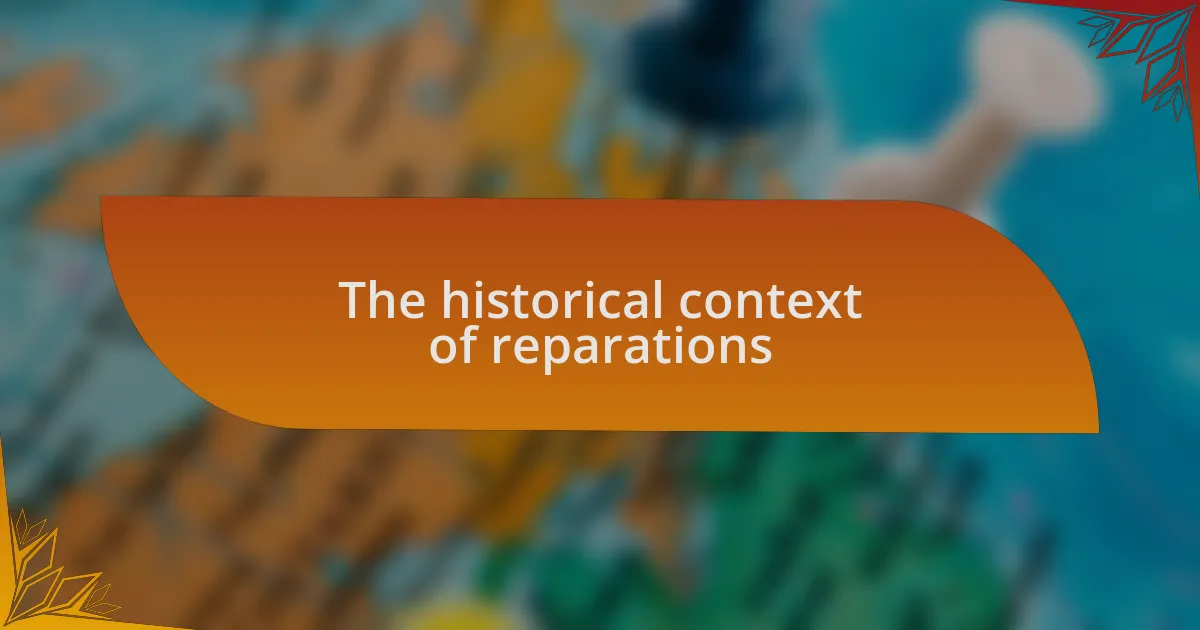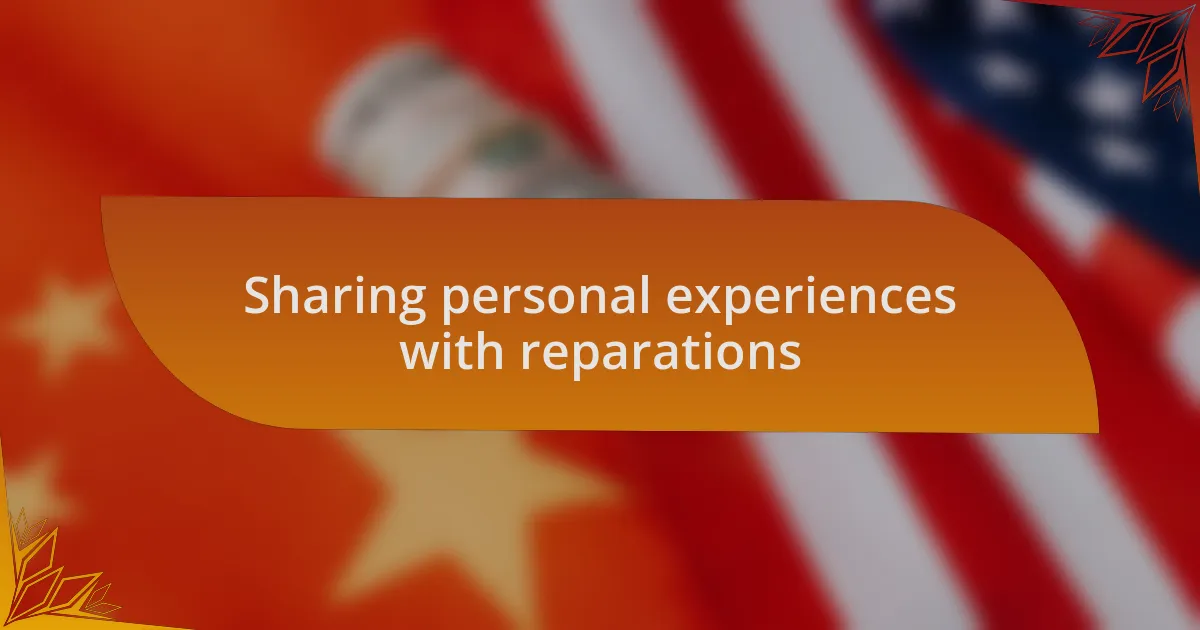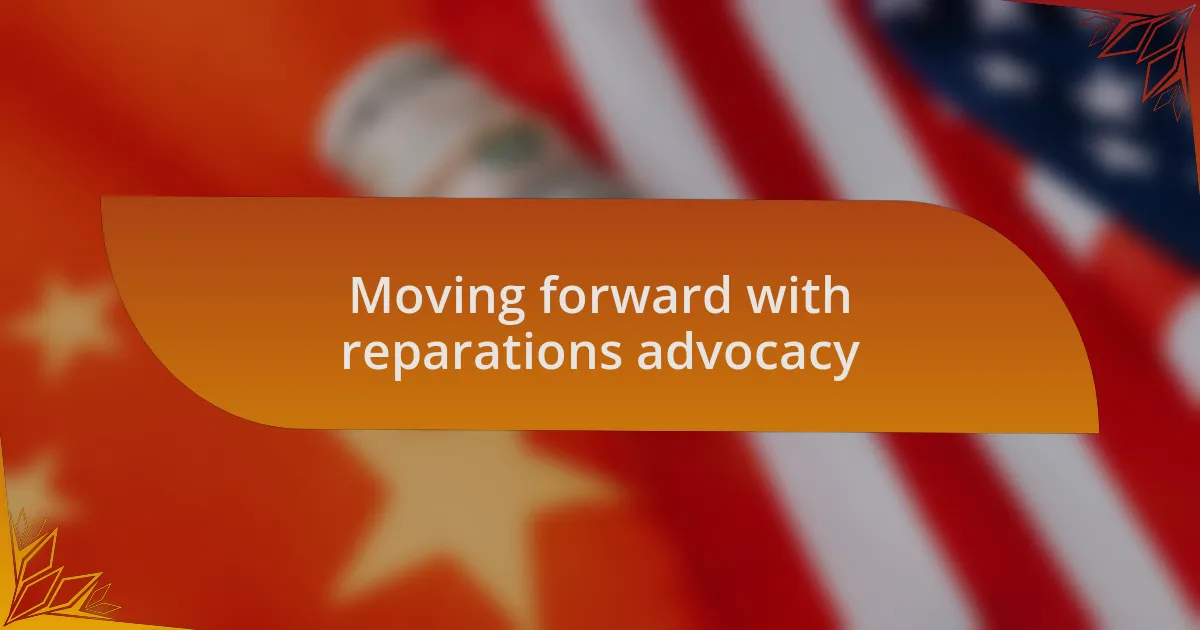Key takeaways:
- Reparations politics is complex and personal, focusing on acknowledgment, recognition, and healing beyond financial compensation.
- The historical context of reparations in the U.S. includes unfulfilled promises post-Civil War and advocacy from movements like the Civil Rights Movement.
- Sharing personal experiences is vital for understanding the lasting impacts of historical injustices and fostering genuine dialogue on reparations.
- Advocating for reparations involves educating communities, grassroots movements, and engaging lawmakers with personal testimonies and policy proposals.

Understanding reparations politics
Reparations politics is a profound and often polarizing issue that reaches deep into our societal structure. I remember attending a town hall meeting where the passion in the room was palpable. People shared their experiences of historical injustices, and I couldn’t help but wonder: how can we truly rectify the wrongs of the past without understanding their full impact?
As I navigated conversations with friends, it struck me how deeply personal reparations felt for many individuals. For some, it’s not just about financial compensation; it’s about acknowledgment, recognition, and healing. Isn’t it crucial to ask ourselves how these discussions affect the sense of justice for generations that have been marginalized?
The complexities of reparations can also lead to discomfort. I found myself grappling with various viewpoints—some advocating for direct payments, while others emphasized systemic change. It made me think, can we reach a consensus on what justice looks like, especially when the histories involved are so varied and often painful?

The historical context of reparations
The notion of reparations traces its roots back to the aftermath of slavery in the United States. I vividly recall discussing this in a community group, where one elder recounted the promises made after the Civil War, particularly the idea of “forty acres and a mule.” It struck me as incredibly poignant how those unfulfilled promises continue to echo through generations.
As I delved into the history, I learned about various movements advocating for reparations, including the Civil Rights Movement. It is fascinating to see how activists since the 1960s have highlighted systemic inequalities, arguing that reparations are essential to addressing the enduring impacts of slavery and discrimination. I think about how these conversations influence today’s climate, and it raises the question: should we view reparations solely through a historical lens or also as a contemporary moral obligation?
Throughout this journey of exploration, I found myself reflecting on international examples of reparations. Countries like Germany, after World War II, chose to acknowledge and compensate victims of the Holocaust. It made me wonder if similar acknowledgment in the U.S. could pave the way for healing. Why is it so difficult to have honest conversations about past injustices?

Sharing personal experiences with reparations
The conversations I’ve had with friends about reparations often bring up personal stories of loss and resilience. One of my friends shared how her grandmother faced systemic barriers that stunted her economic opportunities. Hearing her recount the struggles of living in a segregated neighborhood made me realize that these experiences are not just historical footnotes; they are real and painful realities that persist today.
Reflecting on my own family history, I recall a time when I uncovered records of land ownership that had been unjustly taken from my ancestors. It hit me hard to see how current disparities in wealth can be traced back to these historical wrongs. I often wonder: how can we as a society acknowledge these injustices without a genuine dialogue around reparations?
At a recent town hall, I listened to a powerful testimony from an elder who described his family’s generational trauma stemming from slavery. The pain and anger in his voice resonated deeply with me. It drove home the point that sharing such personal histories is crucial; it’s not just about money, but about recognition, healing, and the promise of equitable treatment moving forward. Isn’t it time we listen and act decisively on these stories?

Moving forward with reparations advocacy
To advance reparations advocacy, it is essential to cultivate a community committed to education and awareness. I remember attending a workshop where speakers shared the implications of reparations in various communities. It was eye-opening to hear stories from individuals who had never considered the intergenerational impacts of historical injustices. This made me ask myself: how can we foster a wider understanding of these concepts?
Moreover, grassroots movements play a critical role in pushing for reparations policy. One weekend, I joined a local group rallying for reparations, and the energy was palpable. It was inspiring to see diverse voices coming together, united by the belief that reparations are not merely a financial concern but a moral imperative. What if more people realized that participating in these movements can create powerful change?
Ultimately, engaging lawmakers requires a multi-faceted approach that combines personal testimonies with concrete policy proposals. During a meeting with local representatives, I shared my family’s experience with historical injustices and the importance of addressing these wrongs. I felt a sense of urgency when I articulated that reparations are a necessary step toward justice and equity for all. How can we not take action when the stakes are so high?